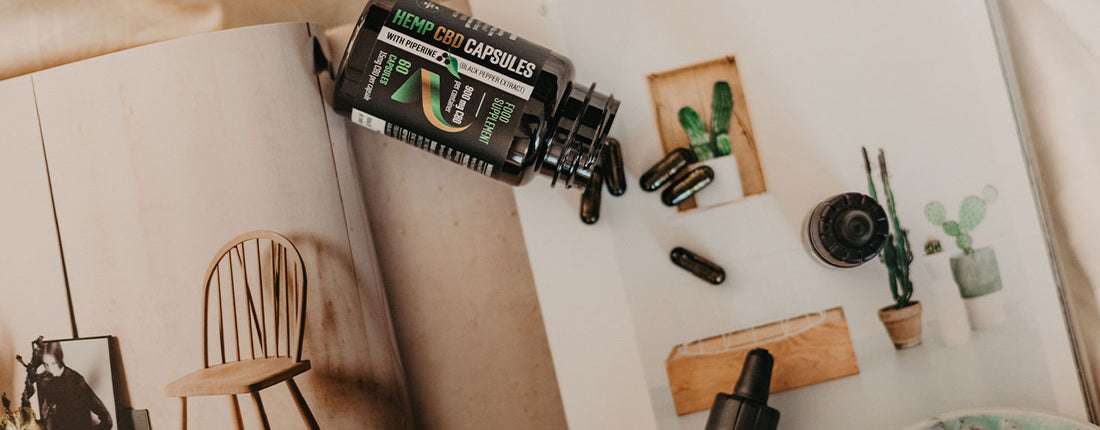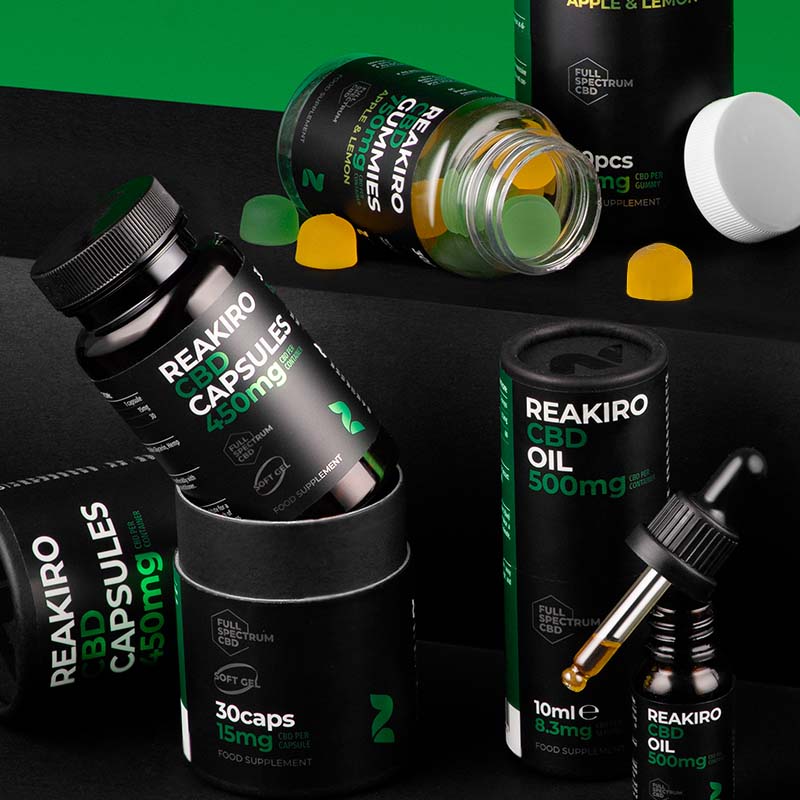Table of Contents
- Is CBD addictive?
- CBD effects: What does CBD do to your mind and body?
- Can you get 'high' from CBD?
- Side effects and risks of CBD
- Can your body get addicted to CBD?
- How much CBD is safe?
- Is CBD Oil safe with other medications?
- Reakiro CBD FAQs
- Is CBD safe?
- Is CBD addictive?
- Is CBD legal?
- Why do people take CBD?
- How can I find CBD products?
Is CBD addictive? - CBD is not addictive. For those worried and asking the question, “Is CBD safe?”, we and dozens of studies can say it is safe.
Using CBD doesn’t have harmful side effects, and you won’t get addicted to it. CBD is found in numerous CBD-based products, such as oils, gels, edibles, gummies, pastes, sprays, vitamins, and countless others that companies such as Reakiro continue to formulate. Despite how popular CBD is, this isn’t because it’s an addictive substance.
CBD is popular because of the numerous physical and mental health benefits, such as managing people sleep, making pain easier to cope with, reducing inflammation, combatting the side effects of certain medication, and it’s even known to help those struggling with depression and anxiety.
Is CBD addictive?
No, it’s not, you don’t need to worry about becoming addicted to CBD in the same way people can from smoking or taking cannabis, weed, or marijuana.
Even the World Health Organization (WHO) has confirmed that: “In humans, CBD exhibits no effects indicative of any abuse or dependence potential…. To date, there is no evidence of public health related problems associated with the use of pure CBD.”
One of the reasons for this is CBD doesn’t include the chemical that causes the “high”, and, therefore, addiction people can get from weed or marijuana. This chemical is also naturally occurring and is known as Tetrahydrocannabinol (THC).
THC is one of 113 naturally occurring chemicals found in cannabis (or hemp) plants; it’s a naturally occurring lipid, scientifically known as a Delta-9-THC isomer. It evolved to protect cannabis plants from insects, ultraviolet light, and environmental stresses.
However, it's psychoactive and affects the human brain in several ways, causing a natural “high” and contributing to the reason people become addicted to weed. It’s the main reason cannabis is illegal in many countries, whether in a pure form or in other products. Even in countries where cannabis and cannabis-based products are legal, the amount of THC is controlled and regulated.
On the other hand, CBD does not include THC. And even when tiny amounts of THC are present, such as in Raw Hemp Paste products, the percentage is below the 0.2% THC allowed under EU and UK regulations.
It’s not just the WHO; the UK MHRA (Medicines & Healthcare products Regulatory Agency), UK Food Standards Agency (FSA), and US Food and Drug Administration (FDA), have all confirmed that CBD is safe, contains no addictive properties, and can be consumed or used a number of different ways without harmful side effects.
You can eat, drink, or smoke CBD, or apply it to your skin, without worrying about getting addicted.
CBD effects: What does CBD do to your mind and body?
According to Harvard Medical School, CBD is known — based on various studies that Harvard has compiled here — for producing numerous mental and physical health benefits.
- Anxiety Studies and clinical trials are exploring the common report that CBD can reduce anxiety.
- Insomnia. Studies suggest that CBD may help with both falling asleep and staying asleep.
- Chronic pain. Further studies are needed to substantiate claims that CBD helps control pain. One study from the European Journal of Pain suggests CBD could help lower pain and inflammation due to arthritis when applied to the skin. Other research identifies how CBD may inhibit inflammatory and neuropathic pain, which are difficult to treat.
- Addiction. CBD can help lower cravings for tobacco and heroin under certain conditions, according to some research on humans. Models of addiction suggest it may also help lessen cravings for alcohol, cannabis, opiates, and stimulants.
CBD comes with numerous benefits for the mind and body. From reducing anxiety, managing people sleep, pain, inflammation, and reduce cravings from addictions.
Can you get 'high' from CBD?
No, you can’t get high from CBD. Unlike weed and marijuana, CBD doesn’t include the “high” inducing psychoactive chemical, known as Tetrahydrocannabinol (THC).
In cannabis-based products, with enough THC, people get high. This also contributes to cannabis, or weed being addictive. You don’t need to worry about that with CBD; it can relax you, but it won’t get you high.
Side effects and risks of CBD
Although side effects are limited, it’s worth remembering that CBD does come from hemp, and as a natural food supplement, there are alway some small potential side effects. That’s why the UK Food Standards Agency (FSA) recommends vulnerable groups avoid CBD, or consult a doctor, and that most people limit themselves to 70mg servings per day.
Harvard Medical School also says that: “Side effects of CBD include nausea, fatigue and irritability. CBD can increase the level of blood thinning and other medicines in your blood by competing for the liver enzymes that break down these drugs. Grapefruit has a similar effect with certain medicines.”
If you're unsure or feel any adverse side effects, reduce how much CBD you consume or consult a doctor.
Can your body get addicted to CBD?
CBD is safe and it’s not addictive. Always take CBD in moderation, but don’t worry about getting addicted. CBD doesn’t include the same sort of chemicals that cause addiction that people can get from smoking or taking too much weed.
CBD is based on a naturally occurring chemical in hemp plants, and numerous studies have shown that CBD doesn’t cause addictions. It’s one of the main reasons for CBD being legal and safe to consume in a number of formats, including eating, drinking, and smoking it through vape pens.
How much CBD is safe?
As with anything, moderation is always advisable. In the UK, the Food Standards Agency (FSA) gave notice to CBD companies that they needed to change the labeling on products in 2021 to include new guidance.
The FSA “recommends [healthy adults consume] no more than 70mg a day (about 28 drops of 5% CBD) unless under medical direction.”
So, although these products are considered safe, the FSA is recommending people don’t take more than 70mg per day of CBD. They also recommend pregnant and breastfeeding women, and anyone taking other medicine consult a doctor before consuming CBD products.
Emily Miles, Chief Executive of the Food Standards Agency, said:
“We are advising that CBD could be risky for vulnerable groups, and suggesting an upper limit of 70mg a day for everyone else taking the product.
The actions that we’re taking today are a pragmatic and proportionate step in balancing the protection of public health with consumer choice. It’s now up to industry to supply this information so that the public can be reassured that CBD is safe and what it says it is.”
Reakiro CBD products adhere to UK FSA guidelines and follow the relevant guidelines under the ‘Novel Foods’ regulations. We also regularly publish a Reakiro Certificate of Analysis, so that anyone who’s unsure of CBD products knows they’re safe and free from any contaminants.
Is CBD Oil safe with other medications?
As with any herbal remedy, CBD Oil can be taken alongside other medications. It’s not a medicine, nor a drug, and in many countries is classed as herbal, or ‘novel.’ However, if you’re concerned, or are taking medication, it’s always worth consulting your doctor to get a medical opinion.
In the UK, the FSA recommends that vulnerable groups — pregnant women, breastfeeding women, and anyone taking medication — either avoid CBD products, limit their dosages, or ask a doctor for advice.
Reakiro CBD FAQs
-
Is CBD safe?
Yes, CBD is safe for human consumption. You can eat, drink, smoke it, and even apply CBD to your skin, without harmful side effects. Numerous studies, including those by government agencies responsible for food and drugs, food standards, and medicines, have said that CBD is safe. Although many recommend only taking it in moderation, such as limiting yourself to 70mg per day, there’s no reason you can’t benefit from CBD.
For those who are pregnant, breastfeeding, or taking medication, it’s worth asking a doctor for advice as to whether CBD is safe. However, for everyone else, CBD is perfectly safe and comes with numerous physical and mental health benefits.
-
Is CBD addictive?
No, there’s no risk of addiction to CBD. Numerous studies, including those by responsible health and food agencies — such as the World Health Organization (WHO), UK MHRA (Medicines & Healthcare products Regulatory Agency), UK Food Standards Agency (FSA), and US Food and Drug Administration (FDA) — have confirmed that CBD is not addictive.
You can’t get addicted to CBD. It doesn’t contain the same psychoactive chemical found in weed, known as THC.
Research confirms that: “CBD does not have the same intoxicating properties that THC has. Research suggests it has a good safety profile and is well tolerated at doses up to 600mg to 1,500 mg.” So, even though some national food safety agencies, such as the UK’s FSA, recommended doses of 70 mg per day, studies have found that people can take CBD in much larger dosages, as high as 1,500 mg.
-
Is CBD legal?
One consequence of CBD’s non-addictive properties makes CBD safe enough to be legal in many countries. If it wasn’t, it would be considered a drug, classified as illegal, and not be for sale online and in thousands of shops worldwide. In the UK, Europe, the US, and dozens of other countries worldwide, CBD is considered a herbal remedy, and therefore, legal. It doesn’t cause addiction or harmful side effects.
CBD is safe to consume, in moderation, and is not classified as a drug. You can put it in a drink at work, or smoke it in a vape pen, or eat an edible gummy, without worrying.
-
Why do people take CBD?
People take CBD for a wide number of reasons. It’s a supplementary health product, something that people can take alongside and with food. It’s not a medicine, nor is CBD a drug. It’s legal, safe, and not additive.
As research shows, CBD “interacts with the body's endocannabinoid system”, which means it can attach to “endocannabinoid receptors” in the brain. These influence “pleasure, movement, memory, and thought.”
Hence one of the reasons people take CBD is to reduce stress, anxiety, insomnia, pain, and even addictions. There are numerous good reasons to take CBD in a number of ways; it all depends on what you prefer, why you want CBD, and how it interacts with your mind and body.
-
How can I find CBD products?
Reakiro is one of Europe’s leading producers and retailers of CBD products. Reakiro CBD products include:
- CBD Oils (take it under the tongue, or add a few drops to food or drinks)
- Organic CBD Raw Hemp Paste
- CBD Capsules
- CBD Gel
- CBD Gummies
- CBD Sprays
- CBD-based Skin Care Products
- CBD Vitamins
You can buy any Reakiro award-winning CBD product — including oils, capsules, gels, organic hemp paste, gummies, sprays, skin care products, and vitamins — from a wide variety of UK retailers, in-store and online, including:
- Reakiro CBD Shop Official
- Holland & Barrett (online and across 715 UK stores)
- Amazon UK
After trying one of our products, please leave a CBD review online, and give us feedback. We always want our products and level of customer service to meet and exceed expectations. Reakiro offers discounts and freebies for customer feedback.
If you’ve got an idea for a new Reakiro product, or are happy — or unhappy, for any reason — with any Reakiro CBD product, then contact us, or leave a review. We love hearing from customers!
Disclaimer: Reakiro is a manufacturer and retailer of CBD products, and we take every reasonable step to ensure our products are safe, and in-line with UK and EU regulations. However, in this article and other content on our website and social media, we make no medical claims on the effectiveness or side effects of CBD.



